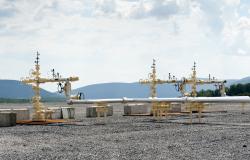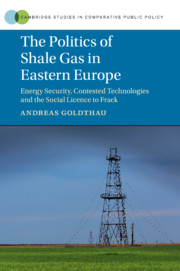Book Review – The Politics of Shale Gas in Eastern Europe: Energy Security, Contested Technologies and the Social Licence to Frack

Book Review – The Politics of Shale Gas in Eastern Europe: Energy Security, Contested Technologies and the Social Licence to Frack by Andreas Goldthau. Cambridge: Cambridge University Press 2018. 212 pp., £75 hardcover 9781107183940
The Politics of Shale Gas in Eastern Europe aims to explain why, despite sharing similarities, Eastern European countries – namely Poland, Bulgaria and Romania – have different positions vis-à-vis the technology of fracking. Indeed, the countries share similar features, such as a communist past and dependence on energy coming from abroad, mainly Russia. And yet, while Poland is committed to foster the exploration and production of shale gas through this technology, Bulgaria has banned both activities. Between these two extremes, Romania is somehow ‘neutral’ and exploration in the country has stalled. This book, however, is more than an account of shale gas in Poland, Bulgaria, and Romania. While analysing the politics of shale in these countries, it considers and explores wider concepts and issues such as policy regimes, contested technology and the ‘social licence to frack’.
 To explain different positions vis-à-vis fracking in Eastern Europe, Goldthau applies the concept of policy regime and builds on the literature on interest, ideas and institutions. A policy regime is defined as a governing arrangement consisting of ideas, interests and institutions that generates policy in a particular issue area. Interests represent societal, economic or political stakeholders in given issue areas who may face gains or losses from a new policy or from policy change. Institutions relate to decision-making procedures, norms and rules, and provide incentives and constraints for state and non-state players. Finally, ideas are defined as ‘frames’ that generate interpretations of a given policy problem and define and constrain the range of policy options available to address the problem. The general hypothesis explored in the book is that ‘if the policy regime surrounding shale gas is strong, governmental policy agendas are adopted and implemented successfully’. Strong regimes – it is argued – generate cohesion while weak regimes are likely to cause policies to fail. In addition to this general hypothesis, three specific hypotheses aim to assess the role of interests, institutions and ideas in fostering support for governmental shale gas policy agendas and facilitating their adoption and eventual implementation. The book adopts a Most Similar Systems Design and builds on a wide range of interviews which are used nicely and effectively to support the analysis. The three empirical chapters unpack the politics of shale in Poland, Bulgaria and Romania. For each country, the author analyses the policy context, the actors and sector governance (interests), the policy approach (institutions) and the policy narratives (ideas). At the end of each chapter, a final section provides an overall assessment of the policy regime in the given country. The book concludes with a comparison of the results of the analysis together with a reflection on the main findings and takeaways.
To explain different positions vis-à-vis fracking in Eastern Europe, Goldthau applies the concept of policy regime and builds on the literature on interest, ideas and institutions. A policy regime is defined as a governing arrangement consisting of ideas, interests and institutions that generates policy in a particular issue area. Interests represent societal, economic or political stakeholders in given issue areas who may face gains or losses from a new policy or from policy change. Institutions relate to decision-making procedures, norms and rules, and provide incentives and constraints for state and non-state players. Finally, ideas are defined as ‘frames’ that generate interpretations of a given policy problem and define and constrain the range of policy options available to address the problem. The general hypothesis explored in the book is that ‘if the policy regime surrounding shale gas is strong, governmental policy agendas are adopted and implemented successfully’. Strong regimes – it is argued – generate cohesion while weak regimes are likely to cause policies to fail. In addition to this general hypothesis, three specific hypotheses aim to assess the role of interests, institutions and ideas in fostering support for governmental shale gas policy agendas and facilitating their adoption and eventual implementation. The book adopts a Most Similar Systems Design and builds on a wide range of interviews which are used nicely and effectively to support the analysis. The three empirical chapters unpack the politics of shale in Poland, Bulgaria and Romania. For each country, the author analyses the policy context, the actors and sector governance (interests), the policy approach (institutions) and the policy narratives (ideas). At the end of each chapter, a final section provides an overall assessment of the policy regime in the given country. The book concludes with a comparison of the results of the analysis together with a reflection on the main findings and takeaways.
The three empirical chapters provide a rather diverse scenario about the position of the countries vis-à-vis shale gas. Poland’s shale gas regime is comparably strong. The diverse set of interests existing in the country is accounted for, and the policy narratives of security gains and economic development are supported by governmental actors as well as societal groups. The weak part of the system is in the institutional procedures with problems such as the limited administrative capacity and the lack of coordination between relevant state authorities. Bulgaria’s shale regime is instead weak. This is due to poorly designed institutional procedures, low administrative capacity and top-down processes that alienated stakeholders. Differently from Poland, localized anti-shale gas demonstrations gained momentum in several Bulgarian cities and the Parliament voted in favour of banning the fracking technology. In Romania the instability of the political system created confusion among the population and leaders, and prevented the emergence and inclusion of stakeholders. Institutional and administrative capacity was low and the narratives proposed by the government (economic opportunity) were not shared by key constituencies, which instead proposed alternative anti-neoliberal and environmentally conservative narratives. Bulgaria’s policy regime on shale is therefore weak. The analysis supports the general hypothesis of the book that if the policy regime surrounding shale gas is strong – as it was the case in Poland – governmental policy agendas are adopted. Interests and ideas emerge as valid explanatory factors. When the interests of stakeholders are considered and interpretative frames are shared by core constituencies, shale gas policies are supported. The same can be stated only partially for the role of institutions: procedural arrangements remained top down and did not manage to get support for shale gas policies.
Beyond the interesting and valuable results of what is a thorough and systematic analysis, there are at least four remarkable features of this book. First, it goes beyond a rather commonly shared view of shale gas as a technical problem. Rather, the book highlights how the politics of shale is not simply a mere function of the in favour or against position of the political elite on the one end and the local/environmentalist actors on the other. Rather, the policy of shale depends on a wider range of factors such as domestic dynamics, institutional procedures and processes, as well as potential winners and losers. One of the interesting aspects that emerges is, for instance, the inability of the institutions and existing procedures to deal with the exploration and development of a new unconventional fossil fuel such as shale gas. Second, the book shows how the reluctance towards shale gas is not mainly due to its properties but for reasons contingent on the political economy context in the receiving country. In some countries, especially Bulgaria, fracking became contested because it was perceived as serving the interests of global business over national or local welfare.
Third, the book expands on the concept of the ‘social licence to frack’ as the approval and broad acceptance of the extractive operations within a society. Social licence in unconventional gas involves all levels from local to national. It cannot be simply achieved by, for instance, a vote of parliament on a governmental policy proposal; but ‘it relates to an (informal) agreement between core social constituencies and the government on the socio-economic prospects and consequences of unconventional energy production’. (p.147) Social licence goes beyond the physical operation of carrying out frack jobs in the local context and deals with ‘more fundamental questions about the social desirability and the social acceptance of a given policy agenda that might eventually materialize in the shape of domestic gas supply’ (p.148). Fourth and finally, the book speculates on how the concept of policy regimes can explain emerging and pressing policy issues which, similarly to shale gas, are contested and warrant a social licence to be accepted within society (the author mentions, for instance, artificial intelligence and geoengineering). Contested policies are therefore a promising avenue for future research.
Dr. Francesca Batzella is Lecturer in Politics and International Relations at the University of Hertfordshire.
Image credit: Jeremy Buckingham via Flickr (CC BY 2.0)


